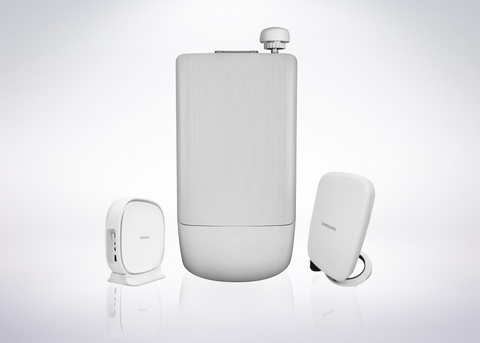Samsung Electronics America’s years of research into millimeter wave appear to be paying off, as the infrastructure vendor has scored Houston as the second city in which Verizon has selected Samsung as its 5G equipment supplier.
Samsung announced in January that it was supplying Verizon with commercial 5G Fixed Wireless Access (FWA) network solutions in Sacramento, Calif. That leaves Los Angeles as the other market that Verizon has announced, but it didn’t disclose which vendor it’s using there.
For Verizon’s commercial rollout in Houston, Samsung will supply 5G end-to-end solutions, including 5G radio and 5G routers (both indoor and outdoor CPEs). In most cases, the indoor router will be sufficient, but it depends on the physical surroundings and structures, so the outdoor router is available as an option.
The intention is to ultimately get to a point where the customer premise equipment is self-installed by the end user, according to Derek Johnston, director of marketing at Samsung.
According to Samsung, it's offering one of the only integrated solutions in the market today, combining what was previously a separate baseband unit and remote radio head (or antenna) into one integrated unit. It measures 13 inches high and 9.1 inches wide and weighs 20 pounds.

“It’s really quite unobtrusive,” Johnston told FierceWirelessTech, noting that Samsung has been working to get the word out to municipalities that 5G network equipment isn’t an eyesore.
RELATED: Samsung applies new RF planning tools to mmWave
Verizon plans to initially launch FWA 5G in four markets this year, but executives weren’t prepared in their second-quarter conference call earlier this week to say whether it will be the third quarter or the fourth quarter.
Of course, there could be more 5G U.S. markets in Samsung’s future. Last year, Samsung talked about doing 5G customer trials in seven markets around the country with Verizon. And Sprint is testing 5G New Radio (NR) gear from Samsung, along with Ericsson and Nokia.
RELATED: Samsung VP pleased millimeter wave working better than expected in Verizon trials
Samsung has been gradually increasing its business with Verizon after having been a femtocell provider for many years. In February, Samsung announced that it was selected by Verizon to assist in advancing its 4G LTE Open RAN initiative. That involves supplying Remote Radio Heads (RRHs) and Baseband Units (BBUs) that will be interoperable with other vendors’ products.
In its Public Interest Statement (PDF) supporting the proposed merger with Sprint, T-Mobile noted that it currently uses two network equipment vendors to support its cell site radio equipment infrastructure: Nokia and Ericsson. It explained that it restricts its use of vendors so that it uses only one vendor’s equipment at a site and, to drive further efficiencies into the network, generally relies on a single vendor within an operating market.
Sprint said that because it rolled out different layers of its LTE network at different times and across different spectrum holdings, in many regions it relies on multiple radio access network equipment vendors in the same geography, which has led to some challenges in aligning feature roadmaps in the same market between vendors and higher operational and optimization complexities than if Sprint had a single equipment vendor in these regions.

